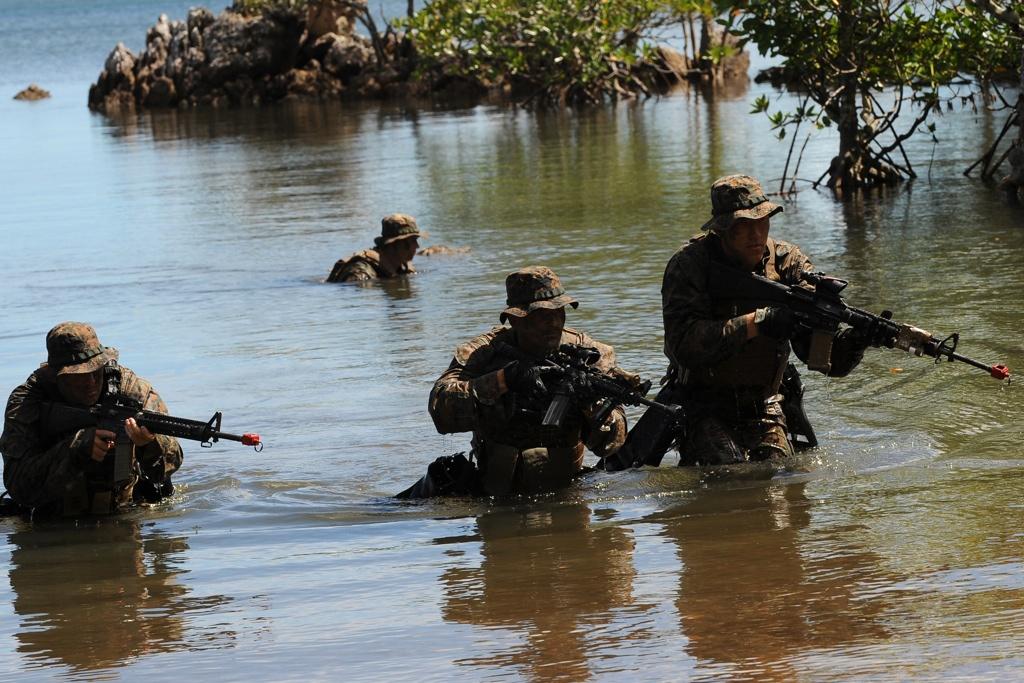US must press Philippines military to stop abuses
US and Filipino soldiers in a joint mock beachfront assault on the shore of Ulugan Bay on Palawan island on April 25, 2012. US and Filipino soldiers stormed the South China Sea island in war games that took place not far from a real-life maritime standoff between Manila and Beijing.
MANILA, Philippines — When the US defense and foreign-affairs secretaries met with their Filipino counterparts this week in Washington, the growing concerns about China’s ambitions in the region were surely discussed.
But if the US wants a professional partner in the region, it should make public any discussions about the continued lack of accountability that plagues the Philippines’ armed forces make it known that impunity for human-rights abuse perpetrated by soldiers and officers is an obstacle to closer ties.
Secretary of State Hillary Clinton and Defense Secretary Leon Panetta may have privately asked Philippines officials why abuses attributed to state security forces continue but they should have mentioned this publicly. They should make public their inquiries as to why the Philippine military has been not only uncooperative in investigating cases of extrajudicial killings, torture and enforced disappearances but, in some instances, has actively sought to undermine investigations. Clinton and Panetta met with Foreign Affairs Secretary Alberto del Rosario and Defense Secretary Voltaire Gazmin in what is called the “2+2” dialogue.
The close relationship between the Philippines and the United States goes way back, with the US playing a key role in how its former colony in Southeast Asia has transformed itself, for better or worse. The strength and significance of this relationship is being tested once again. Philippine officials have not minced words in declaring that US help is needed in confronting China over the resource-rich South China Sea that China, the Philippines and other countries claim as their own.
There is no question that the US has been willing to provide such help. In April, the two countries held their largest annual joint military exercises called Balikatan (“shoulder to shoulder”). This is aimed not only at training the Philippines armed forces but at flexing US muscles in Southeast Asia as part of its so-called pivot in the region.
The question, however, is whether the Philippine military has been behaving well enough to deserve increased military cooperation from the US.
Human rights violations are not new for Filipinos. They have heard over and over again about the extrajudicial killings of activists, environmentalists, journalists and critical members of the clergy, among others. When Benigno S. Aquino III, the son of the late president Corazon Aquino, took office in 2010, he promised sweeping reforms, including stopping abuses by state security forces. While the number of incidents has dropped, the lack of accountability remains a problem.
Court cases and investigations are barely moving, even as new violations are being committed. Worse, there is evidence that the Philippine armed forces has frustrated investigations. “Our problem is that the military has been very uncooperative,” Loretta Ann Rosales, the chairman of the Philippine Commission on Human Rights, complained last week, referring to a case in which the military took more than a year to turn over evidence.
Earlier this year, Philippine Justice Secretary Leila de Lima fired off a letter to Gazmin, the defense secretary, complaining about the military’s move to go over the head of her department to transfer two soldiers charged with kidnapping and illegally detaining two students to military custody. De Lima stopped short of accusing the military of obstructing the course of justice.
The Aquino administration’s failure to arrest retired Maj. Gen. Jovito Palparan in the same case has worsened the climate of impunity in the Philippines. A warrant was issued in December for the arrest of Palparan, who was the public face of the military’s brutal campaign against leftist activists under the previous government of Gloria Macapagal Arroyo. But Palparan has evaded arrest and is believed to have received help from his former colleagues in the armed forces. A former governor accused of masterminding the murder of a journalist has also evaded arrest, with Aquino officials offering him more time to surrender in deference to his former position. He remains at large.
Philippine officials insist that respect for human rights has been well integrated in the defense establishment. The training and the rhetoric have improved, but the true barometer of respect for human rights is the prosecution of alleged violators, which could in turn break the back of impunity. Sadly, this has not been happening.
Even the US realizes this, which is why it put a portion of its assistance to the Philippines on hold until the Philippine armed forces mended its ways and the government investigated and prosecuted violators within the military. It is important for public and private messages at senior levels to reinforce this concern.
The US needs a professional and well-disciplined military as a strategic partner in the region. Clinton and Panetta should declare publicly that if the US wants the Philippines to be that partner, it must root out and make an example of members of the armed forces who commit abuses.
Carlos H. Conde is an Asia researcher covering the Philippines for Human Rights Watch.
Editor's note: This piece was updated to reflect reports that the issue of human rights abuse was raised privately in the talks between the US and the Philippines.
Every day, reporters and producers at The World are hard at work bringing you human-centered news from across the globe. But we can’t do it without you. We need your support to ensure we can continue this work for another year.
Make a gift today, and you’ll help us unlock a matching gift of $67,000!
